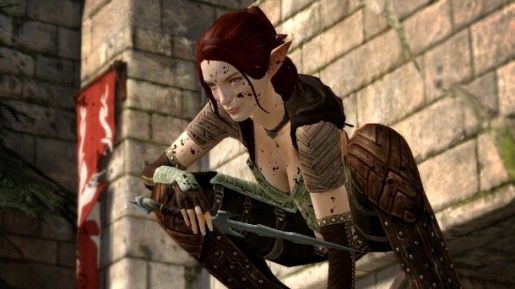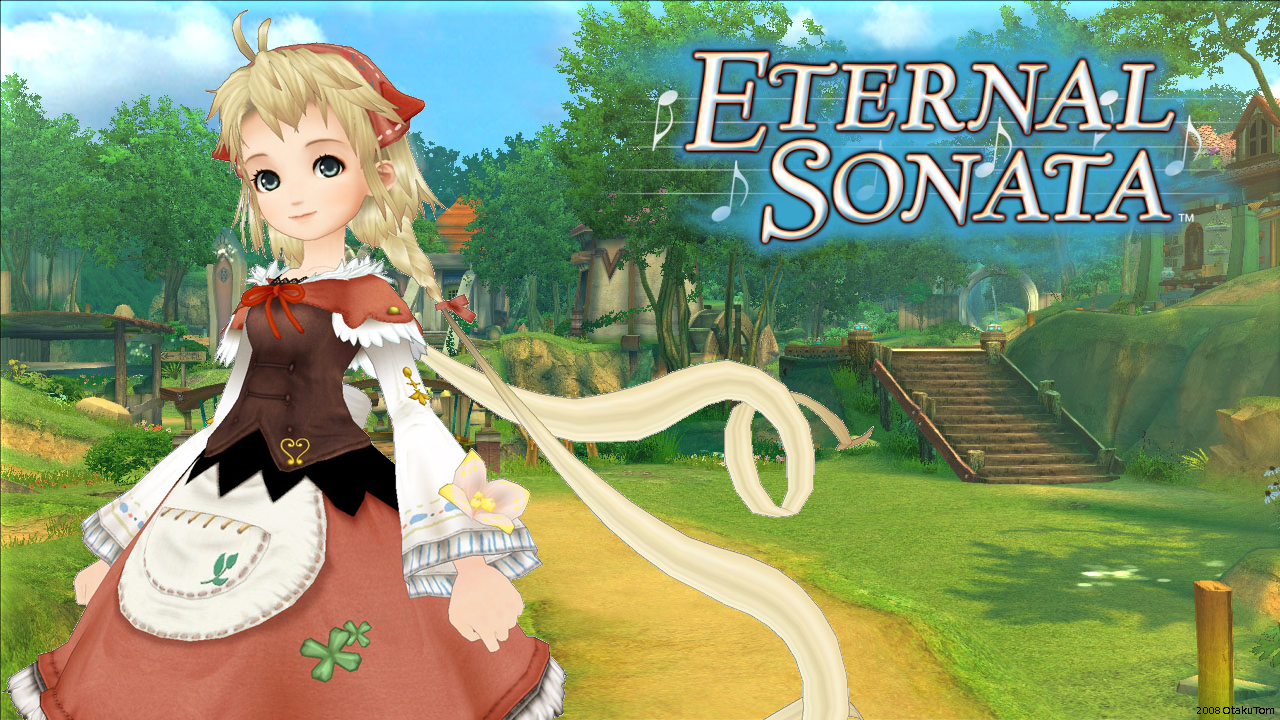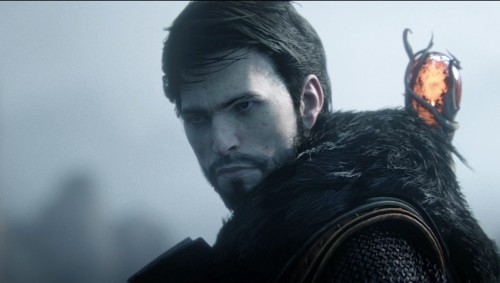 Overview:
Overview:It is perhaps impossible to review Dragon Age 2 without making comparisons to its predecessor. Dragon Age: Origins was a stunning achievement in late 2009, winning multiple game of the year awards and lauded as one of the best RPGs of the generation. Considering the daunting tasks that the game had to achieve and how well it succeeded - creating an immersive setting, establishing a fun and tactical gameplay system, and building a strong fanbase for future games to capitalize on - it's no wonder that the game took 5 years for the RPG veteran Bioware to complete.
Comparatively, Dragon Age 2 was released in March of 2011, less than 1.5 years from the release of the original in November of 2009.
That was probably the first clue that something was wrong.
Admittedly, a large part of the effort that went into making Dragon Age: Origins was completed with the first entry in the series: establishment of lore being the main part. Still, 1.5 years is a short turnaround for an epic RPG series, and I was worried that the brief development time might impact the quality of the sequel.
I was right to be worried.
Story:Dragon Age 2 throws you back into the immersive and wonderfully-crafted world of Thedas, a world where perhaps only 1.5 years ago you were playing a Grey Warden fighting a seeming hopeless war against the Blight. While your warden's adventures took place mostly in the nation of Ferelden, Dragon Age 2 focuses on your character's life in Kirkwall, a coastal city to the north of the blight-stricken Ferelden. This time around, you're forced to play a human (gender and class selectable) named Hawke, and the story largely follows your escapades in becoming a champion of the city.

The overall plot of the game is told through a framed narrative: An NPC named Varric recounts your tale to an enigmatic Seeker trying to uncover how exactly Hawke rose to power in Kirkwall. The gimmick is an interesting one, though it's employed too sparsely to have any meaningful impact; essentially, the game is divided into three major acts and a brief prelude over a 10-year period, with Varric narrating the intermissions between each act. In a 40-50 hour game, the plot device seems tacked on at best, though it does boast excellent voicework and some good humor.
The individual acts succeed (for the most part) on their own storytelling merits, with some throwbacks to your previous decisions (and if you import a DAO save, your Warden's decisions in the first game). Where the story falls apart is trying to tie those loose threads together: Dragon Age 2 doesn't have the same epic feel that Origins so proudly bore; years pass between each act and it's difficult to see how exactly the pieces of the story fit together, largely because they don't. The end result is like playing through a disjointed sequence of events, rather than a tightly constructed tale. While the tale of Hawke's rise to power is still an interesting one, you realize Hawke rises to Champion not because you saved the city or amassed a fortune: Varric simply tells you it happened during the 3 year time jump.
 Gameplay:
Gameplay:When Varric's not telling your story, you take control of Hawke and - depending on your class - maul, backstab, or blast your way through the multiple main and side quests. The core of the gameplay is combat, and here the sequel really shines. While DAO's combat was exciting, it also had a very plodding, almost lazy feel to it. When I watched Alistair slash enemies, he did so with such methodical slowness that it felt almost as if he was trying to move through molasses.
Dragon Age 2 has sped up combat significantly, and it really feels much more fast-paced and alive than its predecessor did. Combat animations are flashy and impressive, and no longer do enemies and allies suffer from "shuffling" syndrome - combat abilities are executed immediately and with ferocious intensity. The introduction of "cross-class combos" also adds a distinctive tactical flare to the game, and a critical element to take advantage of on the harder difficulties. All classes are able to use certain abilities that inflict various status effects on enemies, opening them up to receive further punishment from your allies. Pulling off a cross-class combo is deliciously satisfying, and this feature combined with all the other changes really improve the overall flavor of combat.

Leveling up is a fun experience too. Gone are the single-line of talent points from the first game: instead, players now use a tiered and chained set of talent trees. Various selections unlock new abilities and players can also choose to improve their existing abilities rather than to diversify. The improvements are significant, so no talent point feels like it's been wasted. By the end of the game, Hawke truly is a formidable master of his craft with dozens of spells and fighting talents at his disposal. The one questionable change from the original game is the removal of skills. Previously, skills such as persuasion and pickpocketing could be improved with each levelup: these skills have all vanished, for no apparent reason. Overall though, the game remains a lot of fun to play.
That said, there are a few changes from the original series that are baffling: first, the overuse of exploding enemies. Enemies vaporize into chunks of blood and gore at the mildest of whacks, smacks and tiffs, and it definitely removes the sense of gritty realness from a game that otherwise is deeply immersive (this has been remedied in a recent patch, to my knowledge). Second, and perhaps more glaring is the removal of the tactical camera present in the PC version of Dragon Age Origins. DAO's tactical camera on the PC version of the game was really a godsend, enabling players to get a wide view of the action and plan their battles accordingly. The removal of that camera is an inexplicable loss.

If only those changes were the only ones to mar Dragon Age 2's otherwise polish. Unfortunately, the short turnaround cycle shows very early on exactly the toll it took on DA2's presentation. First, the encounters - while the first Dragon Age was filled with hordes of evil monsters and darkspawn trying to devour your party, each encounter was carefully crafted and allowed room for tactics to make a difference. Dragon Age 2, unfortunately, relies on what has become infamous as the "wave" mechanic. You first encounter one wave of enemies and engage them; just as you defeat the last one, you realize that literally out of nowhere, new enemies have fallen from the sky or popped out from the earth to swarm you once again. Just as you think you're done mopping up the last of these, a third wave hits you. Mind you, these aren't flying birds or burrowing worms that are attacking you - bandits, undead, darkspawn, and even guards appear out of nowhere to ruin your careful positioning and artificially increase the difficulty of the battles. The result is always a battle of attrition, and a test to see which side can keep their health bars going the longest. Dragon Age 2 employs this tactic for almost every fight in the game. No, I'm not exaggerating; it almost ruins the fun from the new combat flow.
I suppose that the wave-system of enemy encounters might be chalked up to a poor design decision, and in no way related to the constrained time frame between game releases, but there can be no question about my next issue with DA2's design. Recycled Areas. Forums are ablaze with people lamenting Bioware's decision to reuse areas for quests that are supposed to represent different locales. The first Mass Effect also suffered from this problem, but it was a minor nuisance in that game at best: it only really impacted the smallest of sidequests in that game. In Dragon Age 2, the recycled areas cover not only sidequests, but main-plots as well. Every single cave, dungeon, sewer, or estate is literally an exact copy of the one before it. The effect is totally immersion-breaking and an unbelievable misstep for a developer that is lauded for its storytelling skill. Setting is an important part of storytelling; if the setting never changes on the screen, your story will suffer.

When you're not tackling the main quests or being assaulted by endless waves of enemies, Hawke can also pursue (in standard Bioware form) romances among the many companions he'll get to know along his journey. Gay and Straight options are both available, and there's even an option that is doomed (*cough* Aveline *cough). For the most part, these romances are deep, engaging, and have that poignant quality that makes you go "Aww" despite the fact that you're staring at fictional characters animated through lines of code.
Side quests litter the games multiple acts with various degrees of quality, though most are forgettable fetch and deliver quests. Interestingly enough, Bioware actually streamlined the fetch and deliver system so that you don't even need to be asked to find something anymore. Side Quest items are automatically marked for you and Hawke is magically able to identify trash without any knowledge of its significance or its owner. It's somewhat amusing to hear Hawke muse "I hear you've been looking for this," and then hand over random junk to an NPC he's never spoken to and has no connection with.
I suppose it does cut down on the backtracking though.
Graphics & Sound:
Dragon Age 2 features revamped art style, in an effort to distinguish the franchise from more generic fantasy tropes. For the most part, these art style changes have been a hit or miss. The race of Qunari, for example, have absolutely been improved from the original game, where they looked essentially human. Now, they have their own, unique look that easily identifies both the race as well as the Dragon Age game. Darkspawn, on the other hand, seem to have been dumbed down from the horrifying terrors they were in Origins to albino zombies.

From a technical standpoint, Dragon Age 2 serves competently (though it can't compete with games like the Witcher 2). On my average rig, I experienced no major bugs or glitches, and animations and models were done superbly. The environs were adequate, though they quickly became stale, especially with the recycling of maps mentioned previously.

DA2's voice work continues Bioware's tradition of excellent acting and cinematic storytelling. Every character and line was delivered with skill, and I really liked the way Hawke's tone would change based on your play style - Diplomatic Hawke was definitely different from Aggressive Hawke. Other characters are competently voiced as well, and the actor who plays Varric - as both the narrator and comic relief - does an excellent job.
Inon Zur returns to score the sequel to DA Origins and his soundtrack features more memorable tunes that are interesting in their composition and just fun to listen to. Several romantic scores wiggle their way into an otherwise combat-heavy musical experience.
Final Thoughts:I can't help but feel Dragon Age 2 could have been so much more. Some of the design decisions are hard to question. If more time were spent developing new areas instead of redesigning the art style for one. Or if more time was spent implementing unique encounters rather than dumping loads of forgettable side quests onto the player. Hindsight is 20/20, I guess.
It's interesting to see Metacritic's score for the game - professional reviewers average out around 80 while user reviews average at 45 (PC version). Is there some sort of professional conspiracy happening? Not really - Dragon Age 2 by itself is really a good game. It's just that in comparison to the glow of its predecessor, good just doesn't cut it.
 Recommended For:
Recommended For:+ Fans of Dragon Age willing to be open-minded about some of the more obtuse design choices.
+ Fans of RPGs
+ Gamers who Don't mind Deja Vu (Recycled Maps, Forgetabble Side quests)
+ Fans of Bioware Storytelling
+ Gay Romance Points
Not Recommended For:- Dragon Age Loyalists
- Baldur's Gate Loyalists
- People who think other people talk too much
- Homophobes
*This game was reviewed on the PC. Dragon Age 2 is also available on Mac, XBOX360 and the PS3.























































